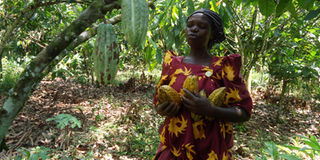Using ICT to boost agricultural output

In Uganda, a number of farmers use mobile phones to transact agriculture-related businesses. This could be in form of making phone calls or sending text messages to purchase agro inputs as well as providing information about their produce that is ready for the market.
What you need to know:
Besides inputs and markets, perhaps the most important ingredient to farming is information.
In Uganda, a number of farmers use mobile phones to transact agriculture-related businesses. This could be in form of making phone calls or sending text messages to purchase agro inputs as well as providing information about their produce that is ready for the market.
A case in point is that of Kampala-based business people who own commercial farms in Zirobwe, Luweero District. They use their mobile phones to keep abreast of developments on their farms while they transact their other businesses in the city.
Transact business
They link with youth groups there, with whom they have an arrangement. Under this, these youth go to the farms, apply fertilisers and herbicides, plough the land and sow seed. This has worked well for them.
However in Kenya and Ghana, the youth have gone ahead to utilise Information Communication Technologies (ICTs) to be at the service of the farmers who may wish to transact business online. One such ICT firm is called Magead, with specialty in web and desktop applications plus mobile wireless technologies.
Similar role
Kwame Bentil, the chief executive officer, while presenting a paper about the technologies during the African Green Revolution Forum held in Addis Ababa, Ethiopia, said the ICT platform used for linking farmers has three components, namely mFarms, mPad and mSurvey all playing a similar role. His team set up this technology through the International Fertiliser Development Centre, with funding from Alliance for a Green Revolution in Africa.
For the farmers living in rural areas who may not have smart phones to access information, the team is in position to send voice messages just to keep them informed of what is going on in the agricultural business setting.
Market opportunities
Farms is a web- and mobile phone-based platform that provides affordable tools to build linkages and improve communications and operational efficiencies among actors along the agricultural value chain.
Bentil explained that the technology comes with a mobile phone application, through which farmers can log in to access whatever information they would wish to know about agricultural produce and inputs.
Farmers who are members of the platform are expected to log in and look for market opportunities for their produce.
They can as well order for farm inputs online and the technology managers sometimes use this software to track activity, for example, who is purchasing fertiliser and at what quantity.
“Farms is designed to create operational efficiencies by allowing organisations, associations and identifiable groups to serve a large number of their geographically dispersed members or affiliates,” Bentil said.
“As a decision support tool, mFarms can be used for production and purchase planning, broadcast of alerts and extension information, verification of adherence to production techniques and schedules and the calculation of production and transaction costs.”
Currently farmers in Ghana and Rwanda are subscribers to the software but the management is thinking of expanding it to more farmers in other countries.
Collect information
Under the mSurvey, the team is in position to survey farmers’ land and be in position to tell them how much seed or fertiliser they need for specific farm sizes. They can as well track losses incurred by farmers during post-harvest period. Mahead is now in the process of putting up database for the purpose of collecting information about what is going on in the agricultural sector in different African countries.
This information is varied and ranges from agronomy practices, pests and diseases, nature of agribusiness, value addition, marketing of farm produce, to the different processes of using different farm inputs.
It is the kind of information, which they can avail to farmers who have subscribed to thier platform.
Similarly, in Kenya, a group of youth have set up an online platform called Nkunma Young, where they are giving information to farmers about farm-related issues using web-based social media such as Facebook and Twitter and other online media like YouTube.
Develop innovations
The founder, Joseph Machira, says that through an online platform, farmers provide information about their produce and also get to know what inputs are sold where, and at what price.
Farmers can also sell produce via the website which they access free of charge by advertising their produce online. If a farmer is faced with the challenge of pests and diseases, he or she may consult for the remedies using the online platform. The management team will provide a solution or an answer using the same platform.
While ICT initiatives are coming up mainly with the youth trying to develop innovations that can help the farmer access information online, there are also alternative methods that have been used in various countries in Africa.
These include the use of radio to video filming of agricultural activities on farm and playing it as mechanism of information reach out to farmers.




